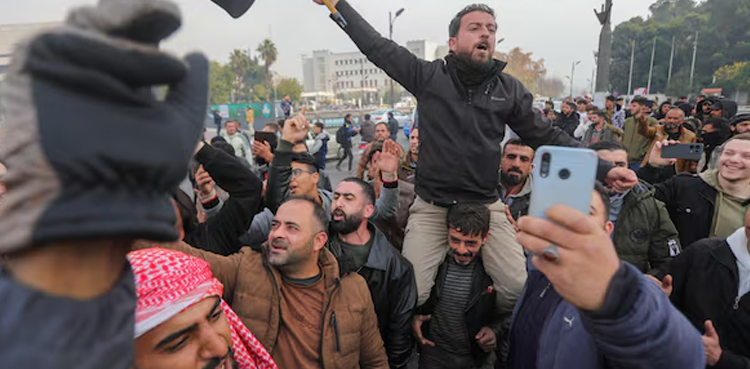
SYRIA: Bewildered and elated prisoners poured out of Syrian jails on Sunday, shouting with joy as they emerged from one of the world’s most notorious detention systems and walked to freedom following the collapse of Bashar al-Assad’s government.
All across Syria, families wept as they were reunited with children, siblings, spouses and parents who vanished years ago into the impregnable gulag of the Assad dynasty’s five-decade rule.
A video verified by Reuters showed newly freed prisoners ran through the Damascus streets in Syria, holding up the fingers of both hands to show how many years they had been in prison, asking passers-by what had happened, not immediately understanding that Assad had fallen.
“We toppled the regime!” a voice shouted and a prisoner yelled and skipped with delight in the same video. A man watching the prisoners rush through the dawn streets put his hands to head, exclaiming with wonder: “Oh my god, the prisoners!”
Read More: Who is Abu Mohammed al-Golani: former al Qaeda chief who led overthrow of Syria’s Assad?
Throughout the civil war that began in 2011, security forces held hundreds of thousands of people seized into detention camps where international human rights organisations say torture was universal practice. Families were often told nothing of the fate of their loved ones.
As insurgents seized one city after another in a dizzying eight-day campaign, prisons were often among their first objectives. The most notorious prisons in and around Damascus itself were finally opened on the uprising’s final night and the early hours of Sunday.
When they reached Sednaya prison, rebels shot the lock off the gate, a video showed, using more gunfire to open closed doors leading to cells. Men poured out into corridors and a courtyard, cheering and helping them open more cells.
In a video uploaded by Step News Agency, a grey-haired man leapt into the arms of relatives in a sudden, disbelieving hug, the three men clasping each other and sobbing with joy before one fell to his knees, still clutching the freed man’s legs.
The pan-Arab Arabiya news channel showed a family arriving in Damascus by car from Jordan to meet their newly released son, the elderly mother’s voice breaking with emotion as she told the interviewer he had been freed after 14 years.
Reuters was not immediately able to verify the locations of some of the videos, though no one disputed that prisons were opened across the country.
RELIEF AND TERROR
In what was purported to be the women’s block at Sednaya prison on the Damascus outskirts, perhaps the most notorious in the country, a rebel recorded the moment he reached cells and pulled open the doors for prisoners who seemed to have had little idea they were about to be freed.
“May God honour you!” a woman shouted to the men freeing her. As they left their cells a toddler could be seen walking the corridor, having apparently been held in the prison along with his mother.
“He (Assad) has fallen. Don’t be scared,” a voice shouts, trying to reassure the prisoners that they faced no more danger.
In another video, a deafening roar erupted as rebels marched down a corridor, said to be in the prison at Mezzeh air base southwest of the old centre of Damascus. Prisoners leaned through the bars at the top of doors and banged on the sides of their cells as shouts of joy echoed all around.
One video showed a shaven-headed man squatting on his heels, trembling and barely able to answer the rebels asking his name and where he was from.
Over the years, thousands of Syrians were brusquely informed by authorities that their relatives had been executed, sometimes years earlier.
The United States said in 2017 it had evidence of a new crematorium built at Sednaya especially to dispose of bodies of thousands of inmates hanged during the war.
Some of the most disturbing information about Assad’s prison system came with thousands of photographs smuggled out of Syria by a military photographer codenamed Caesar who defected to the West in 2013.
His photographs of thousands of killed detainees showed clear marks of torture and starvation and for many families provided the first evidence that imprisoned relatives were dead.
A few miles from Sednaya early on Sunday, a stream of freed prisoners was recorded walking towards Damascus, many lugging sacks of belongings on their backs, and chanting “God is great!”
from ARY NEWS https://ift.tt/6DlFXSW



0 Comments